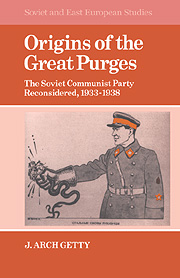Book contents
- Frontmatter
- Contents
- List of tables
- Preface
- Introduction: the Great Purges as history
- 1 The Communist Party in the thirties
- 2 What was a purge?
- 3 The Verification of Party Documents of 1935: a case study in bureaucratic ineptitude
- 4 Radicalism and party revival
- 5 Radicalism and enemies of the people
- 6 The crisis matures: 1937
- 7 Epilogue: the Ezhovshchina
- Conclusion: some observations on politics in the thirties
- Appendix: the Kirov assassination
- Bibliographic essay
- Notes
- Index
- SOVIET AND EAST EUROPEAN STUDIES
4 - Radicalism and party revival
Published online by Cambridge University Press: 23 September 2009
- Frontmatter
- Contents
- List of tables
- Preface
- Introduction: the Great Purges as history
- 1 The Communist Party in the thirties
- 2 What was a purge?
- 3 The Verification of Party Documents of 1935: a case study in bureaucratic ineptitude
- 4 Radicalism and party revival
- 5 Radicalism and enemies of the people
- 6 The crisis matures: 1937
- 7 Epilogue: the Ezhovshchina
- Conclusion: some observations on politics in the thirties
- Appendix: the Kirov assassination
- Bibliographic essay
- Notes
- Index
- SOVIET AND EAST EUROPEAN STUDIES
Summary
Party practice must become thoroughly democratic.
Andrei Zhdanov, 1937Party purges were only half the strategy outlined by party leaders at the Seventeenth Congress in 1934. Stalin and Kirov, along with other high-ranking party leaders, sought a restoration of the party apparatus through education, self–criticism, reorganization, and an attack on bureaucratism at various levels. Stalin had said that the struggle was now for “men's minds”; both he and Kirov claimed that the vast majority of the party's problems could be solved through political education. Because Kirov and his successor Zhdanov would both be identified with this “party revival” program, it is necessary to examine Kirov's assassination at the outset of the campaign.
It is sometimes thought that Kirov was a “moderate” who opposed Stalin's generally hard line on various issues. According to much of the literature, Stalin killed Kirov to clear the way for his policy of terror. In fact, it seems more likely that Stalin and Kirov were allies and that Kirov's death was not the occasion for any change in policy. Indeed, although the Kirov assassination would be dredged up much later (in 1936) to justify an extension of police powers, it had little to do with the problems in the party apparatus at any time.
S. M. Kirov has been identified with a plan of reforms designed to ease social and political conflict and to repudiate Stalin's “policy of general suspicion and universal terror.” Boris Nicolaevsky, speaking as the “Old Bolshevik,” was the origin of this speculation, believing that Kirov favored a reconciliation with former members of the various opposition groups as part of a general relaxation of police vigilance, or “terror.”
- Type
- Chapter
- Information
- Origins of the Great PurgesThe Soviet Communist Party Reconsidered, 1933–1938, pp. 92 - 112Publisher: Cambridge University PressPrint publication year: 1985



